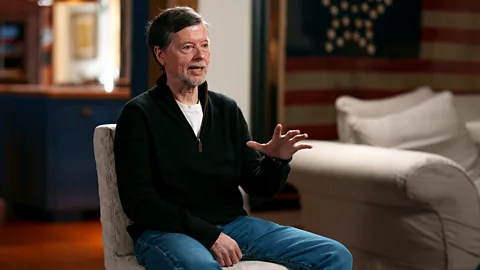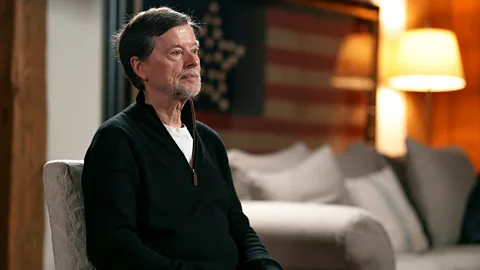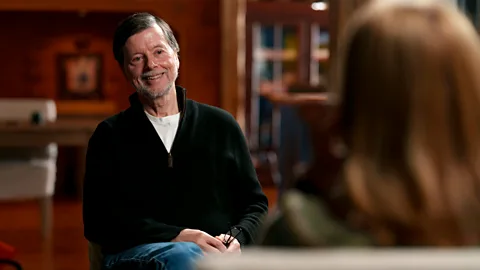'I love my country': Ken Burns on showing the dark parts of America’s War for Independence
 Evan Barlow
Evan BarlowAhead of his upcoming PBS documentary, The American Revolution, acclaimed film-maker Ken Burns tells BBC special correspondent Katty Kay about his unique approach to chronicling US history, from war and conflict to baseball and jazz.
Titles like Brooklyn Bridge, Prohibition and The Dust Bowl may conjure visions of classroom lessons and by-the-book recitations of facts, but portraying historical events in an approachable – and enthralling – way has become US documentarian Ken Burns's trademark. Since the 1980s, he has brought history and culture to audiences in a way that textbooks simply cannot.
Burns's body of work has earned him two Academy Award nominations, two Grammy Awards and 15 Emmy wins. At his home in Walpole, New Hampshire, US, the acclaimed documentary-maker tells BBC special correspondent Katty Kay that, like most creatives, he has more ideas than he knows what to do with.
"Your head might be filled with 40 or 50 topics, as my head is always filled up, but when one [topic] drops down to your heart, you realise it's firing on all cylinders," Burns tells Kay.
Those topics have ranged from jazz to baseball, and from the granular, such as a chronicle of Leonardo da Vinci's life and work, to the expansive, like 2009's The National Parks: America's Best Idea.
 Evan Barlow
Evan Barlow"I don't want to tell you stories about what I know," he says. "I'd rather share with you a process of discovery. So, I dive into things that I don't know enough about." His next area of exploration is the 18th Century: his six-part, 12-hour series, The American Revolution, is due to air on PBS on 16 November. This month marks the 250th anniversary of the start of the American War of Independence, which began in the 13 colonies of British America in 1775, and continued for many years, culminating in the founding of a United States of America.
"The American Revolution is one of the most important events in human history," Burns told PBS ahead of special screenings for students and teachers across the US. "We went from being subjects to inventing a new concept, citizens, and set in motion democratic revolutions around the globe."
On the subject of history, Burns says he does not subscribe to the popular view that it is always doomed to repeat itself, deferring to the opinion of the 19th-Century Spanish-American philosopher George Santayana. "Those who cannot remember the past are condemned to repeat it," was Santanya's comment, in reference to the Holocaust. "It's [a] lovely phrase you'd wish would be true," says Burns. He also points to the famous quote that is attributed to US author Mark Twain: "History doesn't repeat itself, but it does often rhyme."
Burns doesn't gloss over the uncomfortable parts of US history, pointing out that, for him, being patriotic doesn't mean erasing the past; for instance, the fact that Thomas Jefferson owned slaves. "He knew it was wrong, and he kept doing it," Burns says.
Where to find Influential with Katty Kay
Watch Influential with Katty Kay live on Fridays at 21:30 ET on the BBC News channel or stream the full episode on YouTube.
"At the beginning, growing up, I had a kind of idealised version of my country. I love my country. I don't know anyone who loves their country more than me. I make films about the US, but I make films about us."
Burns tells Kay that he believes it can take time for a story's significance to be understood. "I've been interviewing Obama about his administration, and the longer I wait to do that film, the better it will be, because of the perspective that the passage of time will give," Burns says.
 Evan Barlow
Evan BarlowWhen asked about the breadth of his work, which ranges from biographies of single individuals to global events, Burns says that he can be laser-focused on the task at hand. As Burns wraps up The American Revolution and the forthcoming Obama project, he says that he has more than enough material to last beyond "the 2030s" – and, in particular, he has his eyes set on a history of the US's Central Intelligence Agency (CIA).
"Somebody asked of Duke Ellington, who is certainly our most prolific [composer, with] maybe 22…, 2,300, 2,400 compositions, what the most important one is. He said, 'The one I'm working on now.' And to me, that's how we feel."
Influential with Katty Kay airs on Fridays at 21:30 ET on the BBC News channel.
--
If you liked this story, sign up for The Essential List newsletter – a handpicked selection of features, videos and can't-miss news, delivered to your inbox twice a week.
